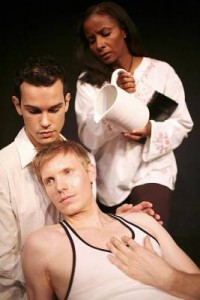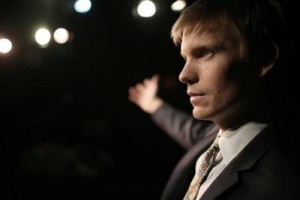
The story of a young gay man’s journey to self-acceptance has been told countless times before in plays, films, and novels. What makes The Sermons Of John Bradley unique (and particularly powerful) is the manner in which playwright/actor Hunter Lee Hughes tells his story, as a series of “sermons” given by the son of a disgraced Southern Baptist preacher. Neither solo performance nor performance art (though it has aspects of both), The Sermons Of John Bradley is ultimately just very fine theater, and a memorable showcase for the talents of a gifted young writer-actor.
Tying the sermons together is Mary T. Sala as the Shaman, who announces to the audience, “You have been called to witness the death of John Bradley. Death is coming!” (For those like myself who are not quite sure just exactly what a “shaman” is, Wikipedia explains: “Shamans are intermediaries between the human and spirit worlds. They can treat illness and are capable of entering supernatural realms to provide answers for humans.”) The gifted Tisch graduate is so committed to her role and so powerful in it that even skeptics should find themselves willing to accompany her where she is leading.
In the first of his sermons, given at the San Jacinto True Believers Church, John Bradley (Hughes) is pondering what steps to take following the revelation of his father’s “indiscretions.” (The preacher has gotten himself “caught in a little scandal with his pants down” in a hotel room, a pair of naked women fulfilling his carnal neeeds.) Should the church close down now that it has no leadership? And what about John’s relationship with his father, who throughout John’s childhood spoke of love all the while mocking and belittling his son for being different?
We next see John Bradley in the midst of a debate competition, with Bradley representing Trinity University and defending gay marriage against debaters from Baylor U. A passionate John recalls the hypocrisy of Declaration Of Independence author Thomas Jefferson, who declared that “all men are created equal,” yet 44 years after the Declaration still owned more than a hundred slaves. “His human frailty prevented him from seeing the unalienable rights” of these human beings, explains John, going on to declare that “gay marriage is an unalienable right because it preserves love, fidelity, and commitment.” Those who oppose gay marriage are doing so from a “violent, irrational prejudice based on scripture,” and John makes a plea to his audience to “change their hearts” for their own benefit. “Think twice before you demean me and my soul mate,” he tells his listeners.
The scene also serves to introduce us to John’s soul mate Trevor (Gavyn Michaels), his debate teammate and “the unofficial seventh member of our family”—that is until John’s father caught the two boys having sex and attacked his son. It’s no wonder John fell head over heels for his “unofficial” brother. Besides his dreamy good looks, Trevor proved himself a true stand-up guy, tackling the enraged preacher man before he could do his son harm. If the relationship between these two young men can withstand the hatred and scorn of a man like John’s father, it ought to be able to withstand everything, right?
Wrong. When next we meet John, he is giving a sermon on “The Power Of Transformation” with all the power and intensity of a Southern Baptist preacher, but the “transformation” John has undergone has made him into the poster child for the American Family Association and the Yes On 8 folks. Disillusioned by Trevor’s serial infidelity following their move to West Hollywood (e.g. Trevor participated in orgies in their own apartment while John was at work), John now declares that “gay relationships are just not workable.” 24-hour bathhouses and hookup sites like Craigslist and Manhunt.com help to confirm the statistics John is now quoting—that the average gay relationship lasts only 1.4 years and involves 8 sexual partners per year outside the relationship—for each member of the couple. Whether the statistics John cites are correct or not, John has now committed to abstinence because, he tells us, only abstinence is going to give him freedom.
As The Sermons Of John Bradley continues, we see John in a 12-step meeting for crystal meth addicts, learn more from him about Trevor’s infidelity, and then, in an interesting turn, hear Trevor give us his side of the argument. “You are so like your father it’s disgusting,” spits out Trevor. Later, the two men reappear dressed only in tight briefs, their otherwise naked bodies covered with glitter, and perform a beautiful and dramatic pas de deux choreographed by Ashley Osler, which seems to depict their relationship both with each other and with crystal meth. Finally, in the play’s most moving “sermon,” John explains the parable of The Prodigal Son in the context of his relationship with his father, and reveals his discovery about love—that it comes in small moments, and that we live for the next small moment of love. Powerful stuff.
Hughes deserves major kudos on all fronts, for writing an original and impactful piece of theater, for giving an intense and intensely personal performance, and for the issues he raises, sure to provoke post-performance discussion. Director Marisa Marco has clearly worked closely with Hughes in fine-tuning his performance. Whether such Sermons gems as the note cards Trevor hands John rhythmically one by one as he enumerates each of his points during the debate, or the funny banter between John and the light booth guy during his Transformation sermon, or the amusing reactions from their fellow addicts as John and Trevor air their dirty laundry in public, whether these moments are playwright or director inspired, they are indeed gems.
As Trevor, Michaels is that rare combination of beauty and talent that separates stars from ordinary people like you and me. (Well, perhaps not you but certainly me.) Besides looking drop dead gorgeous, Michaels has great rapport with Hughes in their moments together. He proves his acting chops as well, commanding the stage in a powerful scene following the gay marriage debate in which Trevor breaks down sick to his stomach and in emotional agony.
Producer Elizabeth Gordon appears as herself in several scenes to fine effect. Julie A. Sanchez’s lighting is striking, as is the backdrop painted by Deni Ponty and Becca Fuchs’ sound design.
My one negative about Sermons is a personal one. If the demoralizing statistics John quotes during the Transformation sermon are true, if his descriptions of multiple gay sex perversions on Craigslist and his depressing prediction that whoever you are in the gay community, you’re likely to end up lonely and alone, if these too are true, does this mean that the Christian homophobes are right, and don’t these statistics serve to add fuel to the anti-gay movement and tear down our arguments in favor or gay marriage in a play that is otherwise gay-affirming?
Regardless, The Sermons Of John Bradley is powerful, powerfully acted theater, and when in the final scene, the dream of “Romeo Gardens” becomes reality, few will have remained unmoved by the journey they have undertaken with John Bradley.
The Lex Theatre, 6760 Lexington Avenue, Hollywood.
www.myspace.com/SermonsOfJohnBradley
–Steven Stanley
January 18, 2009
Photos: Ev Dylan




 Since 2007, Steven Stanley's StageSceneLA.com has spotlighted the best in Southern California theater via reviews, interviews, and its annual StageSceneLA Scenies.
Since 2007, Steven Stanley's StageSceneLA.com has spotlighted the best in Southern California theater via reviews, interviews, and its annual StageSceneLA Scenies.







 COPYRIGHT 2024 STEVEN STANLEY :: DESIGN BY
COPYRIGHT 2024 STEVEN STANLEY :: DESIGN BY